- Home
- Octavia E. Butler
Unexpected Stories
Unexpected Stories Read online
Unexpected Stories
Octavia E. Butler
Contents
Foreword
A Necessary Being
Childfinder
Afterword
A Biography of Octavia E. Butler
Foreword
In a poem I once heard, a lonely young man walking past a desolate alley sees someone, a street denizen, a woman moving in the shadows. She looks familiar and he realizes that this is his mother—dead now for many years.
Reading posthumously published work of an author you loved is like this—shocking, strange, and very sad. And if that work was early on in the author’s career, it’s like seeing your mother as a woman younger and more hopeful than you, than I.
Discovering these lost stories of Octavia Butler is a kind of poetry and revivification: poetry and revivification, the hallmarks of our lost sister. Reading these tales is like looking at a photograph of a child whom you only knew as an adult. In her eyes you can see the woman that you came to know much later—a face, not yet fully formed, that contains the promise of something that is now a part of you: the welcomed surprise of recognition in innocent eyes.
In these stories we find two women faced with war or with peace. Carrying on their backs society’s future or its end. Both women come to us deeply embedded into histories, beliefs, and landscapes that share ghostly traits of our own, stretched and blasted and made strange. We are asked: Imagine a society striated by colors, imbued with a belief about power that isolates and cripples the one who is paradoxically the most important being. Or a teacher, a leader, on the run from the government that now hunts the telepaths it once cultivated as part of a utopian propaganda.
Long before Octavia Butler changed the face of science and speculative fiction, the landscape of the potentials of literature, she was imagining these worlds. She was asking her readers to enter with her into these untried territories with the challenges, the tragedies, the imperatives of being alive and of becoming more. The stories are disturbing. The characters stay on after the reading is finished. Once entered, the premises that made each story its own reality become familiar and this new society no longer seems strange or distant. We find, instead, that our worldview is transformed by an imagination that sees no border between thought and what is real.
Unexpected Stories reveals the themes that would become Butler’s lexicon: the complicating mysteries we assign to power, race, and gender. Octavia Butler wrote these two stories, “A Necessary Being” and “Childfinder,” early on in her journey from reader to writer, from fiction to unassailable reality. She is working out in these two very different stories the purpose she would refine with every book, every series, every word she subsequently wrote.
Walter Mosley
A Necessary Being
The Rohkohn Hao, Tahneh, was sharing her evening meal with her chief judge and discussing the current drought when she first learned of the foreigners who had entered her territory. There were three of them, not traveling north or south over the long strip of coastal desert as she would have expected, but coming from the east through the foothills. Apparently, they were following the narrow dwindling river that had in better times kept Tahneh’s people well supplied with water. The hunter who brought the message described the foreigners as a huntress, a judge, and, startlingly, a young Hao. Tahneh looked sharply at the hunter when he said it.
“You’re certain that it was a Hao and not just a high judge?”
“So the message said, Rohkohn Hao.” And the man quoted. “‘The foreign Hao is male and very young. Perhaps even too young to have been acknowledged by his people. His coloring is unmistakably pure blue and he is much taller and larger than the judge who is with him.’”
Tahneh heard this silently, her face turned away from the hunter. She felt just the beginnings of dread as she began to believe the report. A stupid child-Hao out almost alone on land that belonged to her people! What could his own people have been thinking of to let him wander around so unguarded?
“How far is he from here?” she asked the hunter.
“Two days, perhaps two and a half, Rohkohn Hao. He’s traveling slowly. He had just emerged from the mountains when a group of our hunters saw him and sent word back to us. Since he is coming toward us, our fighters could reach him from here in only a day.”
“Is there any possibility that he saw our hunters—saw them signaling us perhaps?” Tahneh had trouble keeping the hope out of her voice. Even a young Hao would have the sense to take his friends and run if he realized that there were other Kohn in the area. He would not know whether Tahneh’s Rohkohn were hostile or friendly and he would not be foolish enough to wait and find out. If only he had seen her hunters’ light signals.
“He could not have seen them, Rohkohn Hao,” the hunter assured her. “Our hunters made certain that both he and his friends were asleep when they sent their message.” The hunter seemed proud that members of his caste had acted so carefully, so correctly. He added, “Our hunters also ask that we hold our answer until we receive another signal from them—so that we don’t accidently alert the Hao and his party.”
Thorough hunters, Tahneh thought bitterly. A tribute to her insistence on training and discipline. Her body whitened and became slightly luminescent. This was a sign of the approval that she should have felt, but did not feel, a sign to the hunter that he and his fellow hunters had done well.
“Is there anything more?” she asked.
“No, Rohkohn Hao.”
Tahneh let the light go out of her coloring, let her normal blue return and the hunter, understanding that he had been dismissed, turned and left her apartment.
She sat still, ignoring the silent chief judge who sat beside her and staring into the fire of her large fireplace. This particular judge was a friend as well as the top official of her government. She had had liaisons with him before his marriage and after the death of his wife; he was a good companion. But she wished beyond expressing that she had not invited him to eat with her this particular night. In another moment he would speak and say the things she did not want to hear.
After a moment the chief judge’s normal blue-green coloring soared to brilliant white luminescence with his joy. “At last, Tahneh, at last!” The words came out in a harsh whisper. “We must send more fighters—judges—to capture him before those hunters frighten him away!”
Tahneh watched him silently, knowing that his elation would soon be shared by the rest of her people. Another Hao at last. A young one to be the successor that her body had been unable to produce, a child who could probably be captured without the danger and loss of life that would be involved in capturing an experienced adult.
“With his youth,” the chief judge said, “it might even be possible to persuade him to accept the Rohkohn as his people without the usual … coercion.”
“Perhaps,” said Tahneh. She knew that this was a vain hope, that there was no possibility of “persuading” a Hao to betray his people other than by the brutal traditional methods. But she knew too that the words had been meant as a kindness. This judge, more than any other, understood how deeply she hated the traditional ways.
She longed to see the young Hao. She had not seen one of her own kind since the death of her father twenty years before. She had felt her loneliness agonizingly right after his death, but she had been very young herself then—just acknowledged by her people. Her loneliness had passed, or she thought it had. She was surprised at the new loneliness, the desperate need she felt now—need that she knew was in conflict with her fear for the boy, with her hope that he had already fled.
But no matter what she hoped, she had to assume that he had not escaped. For the sake of her people, she had to plan his capture.
She spoke to her chief judge. “We will obey the conventions in this, Ehreh. The Hao and his party are to be brought here unharmed, untouched if possible. They are to be treated as potential friends, not as prisoners. They’re to be convinced that we’re only being cautious with them. If we can make them understand that, then they’ll be careful not to do anything that might make us turn hostile.”
“We can’t be too gentle with them,” Ehreh said. “We can’t take the chance of their escaping.”
“Take a large enough force with you to prevent their escape. Take as many fighters, both judges and hunters, as you think you’ll need. But remember, the point is to give them no reason to risk trying to escape.”
Ehreh stared at her. “You want me to go after them, Tahneh?”
“Would you rather I send someone else—someone with less knowledge of the Hao, someone who’ll lose this boy?”
He considered this, then gave the slight flash of white that indicated agreement. “For that matter,” he said slowly, “you should go yourself.”
“You won’t need me if you do as I’ve ordered!” The words came out more sharply than she had intended and she knew that Ehreh would notice.
He looked at her silently for several seconds. “You’ve been alone for a long time, Tahneh. You should welcome this chance to capture another Hao.”
“The people need him, not me,” she said shortly. “They’ll have him.”
“They will if I can catch him without your help.”
“A moment ago you didn’t even think you were needed to make the capture.”
“A moment ago I hadn’t thought at all. I’m thinking now, though. A Hao … We’ll need you, Tahneh. If he decides to leave his friends, escape alone, we may lose him no matter how many fighters I have.”
“He won’t do that if you don’t give him reason. We Hao don’t particularly like abandoning our friends even when it’s necessary.”
Ehreh laid a hand on her shoulder and she felt the pressure of it heavily. “‘We,’ Tahneh? Already, ‘we’? You must have been more lonely than I thought.”
She said nothing.
“By refusing to go after this boy, you are giving him a chance to escape.”
“I’m giving you a chance to prove that you deserve your high position!” The words stung him as she had intended them to. She saw yellow flicker in his coloring and was pleased. It was better to have him angry and defensive than to have him beginning to doubt that she was acting in the best interests of the people.
“I am not Hao,” he said quietly. “I cannot perform Hao duties.”
“Nor will you define Hao duties.”
His yellow flickering stopped, and to her surprise his coloring faded toward gray. Gray was for the most private and deeply felt grief. “This is an ordeal that both you and the boy must bear, Tahneh.” Ehreh spoke very softly. “We are close, you and I, and I can see the pain that you think your harsh words hide. I understand your sentiment, but the people can’t afford it.”
Tahneh let some of her own gray come through bleakly. “All right, Ehreh, we’ll stop snarling at each other. It’s meaningless anyway; I’ve already made my decision. Gather your judges and hunters and go capture the young Hao.”
“You must come with us!”
Her blue returned at that—returned harshly metallic, a cold threatening color. She said nothing to Ehreh. She only looked at him. He understood that he had gone too far. He rose silently and left her.
When he was gone, she sat still for a long moment, then bent over slowly, very slowly, until her head touched her knees. She rocked back and forth, still moving with agonizing slowness, and her body became a deep gray. Once she spoke the name of her father loudly, sharply as though she were asking a question. But the dead were dead; death was an end. She neither expected nor received guidance. But she did call to mind the memory of her father, sitting on his mat, lying on his pallet, sitting in the litter that the people had used to carry him. She had never seen him standing. He had been old when she was born, and his legs had been useless for two-thirds of his life. The Rohkohn had had to follow the tradition when they captured him. He had refused to renounce his former people—the people from whom the Rohkohn had stolen him—as a Hao was duty bound to refuse, and the Rohkohn had had to cripple him to prevent his ever returning to them. They had burned him with hot irons behind his knees until his lower legs were permanently useless. He had been bitterly vengeful at first, and his agony until his burns healed had helped him make the lives of those who had chosen to serve him hard.
Finally though, as both his physical pain and his emotional anguish receded, as he saw that those he abused and tormented never struck back, he had begun to make the adjustment that some captive Hao never made. He had admitted to himself that the Rohkohn had not acted out of cruelty but out of severe need. They had been without a Hao and that had made them desperate. A Kohn tribe without a Hao was a tribe in the process of dying. Even a captive Hao who might remain forever hostile was a symbol around which the people could gather, and thus was better than no Hao at all. Without a Hao, people had no purpose, no direction, no unity. It was remarkable that the Rohkohn had even been able to work together across the lines of caste to capture him. He had finally accepted their need as sufficient excuse for what they had done to him and he had ceased to fight them. He had accepted liaisons with women of their judge caste, and one of these women had borne him a Hao daughter, Tahneh. He had given advice that had proven good and valuable to the council of judges. Finally, the people, seeing that he had accepted them, acknowledged him as their leader instead of merely a symbol of their unity. He had given them years of good government. He had been a better leader than any tribe had a right to expect of a captive Hao. Only Tahneh’s memory of his legs marred her picture of him. She remembered the way he had propelled himself with short hand-held sticks in the wheeled cart that he had had his artisans build. Sometimes, however, within the privacy of his apartment, the cart had been too awkward and he, not wanting to ask for help, had dragged himself on his hands and knees, unwittingly embittering his young daughter, turning her against the tradition that had so disabled him. Even now, it was painful for Tahneh to remember him crawling.
The Tehkohn Hao, Diut, and his party had followed a narrow river down from the mountains, detouring only when sheer drops made it necessary. They watched the land beyond the river grow dryer and more barren as they descended, while the river itself grew narrower. Vegetation, except in the vicinity of the river, became tough and spiny and Diut had to show Jeh and Cheah the ancient map he carried so that they would be certain they were still on the old trade route—still on a trail that would support life. Once they saw, however, that the trail was outlined in green, a pro-life color, they did not complain about the poor hunting or the increasing heat. They did begin traveling at night, though, at Jeh’s suggestion, and their hunting improved.
By the time they reached the foothills, Diut knew that he was close to the ancient ruins that had been his excuse for traveling so far from his mountain home, his people, and his new Hao responsibilities. He knew too that in spite of the map he carried he could pass by the ruins without seeing them if he was not careful. Even when the desert dwelling was new it must have been well camouflaged. By now, unless it had begun to cave in, it would probably be almost indistinguishable from the various hills and mounds that were normal to this area.
It was because Diut was watching so carefully for the ruins that he spotted his captors before Jeh and Cheah saw them. He was alarmed but he gave no sign to his friends until he had looked around very carefully and seen that the three of them had walked into a wide, remarkably well camouflaged circle of fighters—a circle that was now beginning to move with them.
Diut’s immediate reaction was humiliation. He had been quietly, efficiently captured by a group of hunters and judges. He could see them as though they were uncamouflaged now that he had been alerted to their presence. But he should have seen them before
he walked into their midst. He should have seen them before he led Jeh and Cheah into their midst.
He looked at Jeh, saw that the young judge was just discovering his captivity. Jeh’s coloring had not changed. He did not look around wildly to give notice to his captors that he had become aware of them. But in his eyes, in his movements now there was an animal wariness that had not been there before, and Diut knew that he was looking for a break, a flaw in the circle—an escape route.
The wariness was even more pronounced in Cheah. She was a high huntress, and using her speed and camouflage to escape predators too powerful to kill was second nature to her. Diut spoke to them both very softly, knowing that he might not only be overheard by his captors, but also understood by them. The Tehkohn dialect was very close to the ancient imperial language that all Kohn tribes knew. Diut had seen for himself that strangers picked up his language very easily.
“Jeh,” he whispered. “Cheah! Be still. Don’t resist.”
The two relaxed cautiously, then glanced at him, perhaps wondering how sure he could be of himself in a situation that he had faced before only in training. Diut thought he saw doubt in their eyes and he turned his own gaze bitterly forward. Jeh and Cheah were young, but still they were several years older than he was; they had had more experience. But he was Hao. His eyes and ears were sharper than theirs. He could see that there was no flaw in this circle. More, he could see that this circle contained twice as many people as it should have needed to make it secure, and that those people were a well-disciplined force. The foreign fighters had spaced themselves evenly and now moved together in spite of their numbers.
They did not get in each other’s way as they would have, had they been less well trained. They left no holes big enough for an alert hunter or judge to go through. There was no way out for Jeh and Cheah. But Diut saw that he alone, using the greater strength and speed that was part of his Hao heritage—and perhaps breaking a neck or two—might be able to get free.

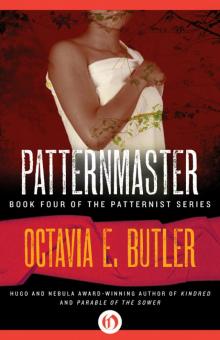 Patternmaster
Patternmaster Survivor
Survivor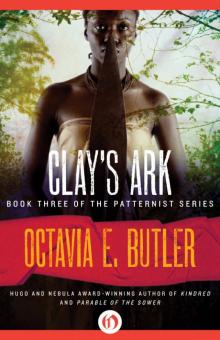 Clay's Ark
Clay's Ark Bloodchild and Other Stories
Bloodchild and Other Stories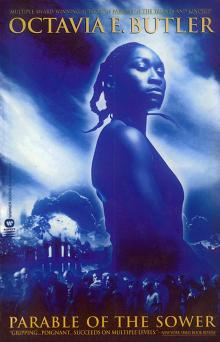 Parable of the Sower
Parable of the Sower Wild Seed
Wild Seed Fledgling
Fledgling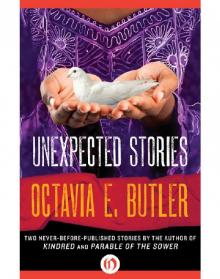 Unexpected Stories
Unexpected Stories Kindred
Kindred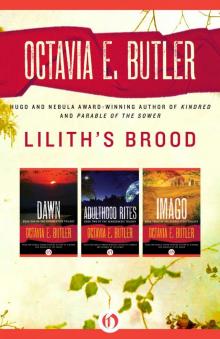 Lilith's Brood: Dawn / Adulthood Rites / Imago
Lilith's Brood: Dawn / Adulthood Rites / Imago Adulthood Rites
Adulthood Rites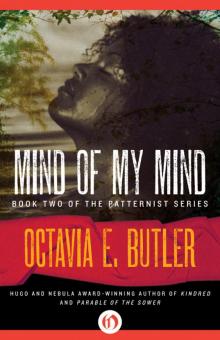 Mind of My Mind
Mind of My Mind Seed to Harvest
Seed to Harvest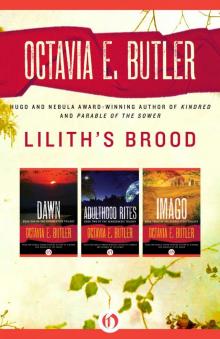 Lilith's Brood: Dawn, Adulthood Rites, and Imago (Xenogenesis Trilogy)
Lilith's Brood: Dawn, Adulthood Rites, and Imago (Xenogenesis Trilogy) Bloodchild
Bloodchild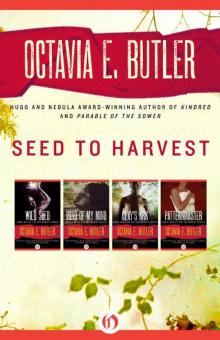 Seed to Harvest: Wild Seed, Mind of My Mind, Clay's Ark, and Patternmaster (Patternist)
Seed to Harvest: Wild Seed, Mind of My Mind, Clay's Ark, and Patternmaster (Patternist)